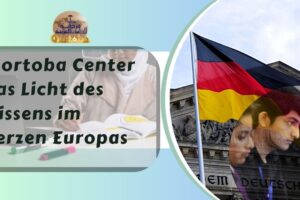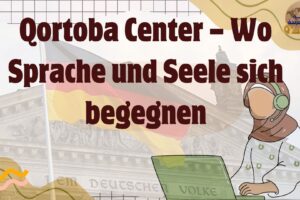
QIAS Arabic Conversation for Children: WALK & TALK FOR CHILDREN
QIAS Arabic Conversation for Children: WALK & TALK FOR CHILDREN
In the formative years of childhood, language acquisition is not merely a cognitive milestone—it is a gateway to identity, culture, and spiritual understanding. For children growing up in non-native speakers environments such as France, Britain, America, Germany & Canada, the opportunity to learn Arabic as both a communicative tool and a sacred language is a profound gift. QIAS Qortoba Institution for Arabic Studies, renowned for its commitment to Arabic and Qur’anic education, offers a specialized Conversation Course for Children that harmonizes linguistic development with cultural and religious literacy. Thanks to QIAS course’s pedagogical framework, curricular design, instructional methodology, and long-term impact, with particular emphasis on its relevance for non-native children in Western contexts, QIAS program is not merely a language course, but a transformative educational experience that cultivates articulate expression, intercultural competence, and reverent engagement with the Qur’an.
Pedagogical Philosophy: Language as Living Practice
The Conversation Course for Children at QIAS is grounded in the principle that language is best acquired through meaningful interaction. Drawing from the communicative approach to language teaching, the course emphasizes spoken Arabic as a dynamic, functional medium. Children are not passive recipients of vocabulary lists; they are active participants in dialogues, role-plays, and storytelling exercises that mirror real-life scenarios.
This methodology aligns with Vygotsky’s sociocultural theory, which posits that language development is deeply embedded in social interaction. By engaging children in structured conversations—whether about daily routines, family life, or religious practices—the course fosters both fluency and confidence. As the Arab adage affirms : “He who learns a language gains a new soul.” من تعلم لغة جديدة، امتلك روحاً جديدة
Curriculum Design: Integrating Language and Faith
The course is meticulously designed to balance secular and sacred content, ensuring that children develop both conversational proficiency and Qur’anic literacy. Key components include:
1-Foundational Vocabulary and Grammar
Children are introduced to essential vocabulary related to family, school, food, and emotions. Grammar is taught implicitly through repetition and contextual usage, allowing young learners to internalize sentence structures without rote memorization.
2-Interactive Dialogues
Lessons are built around age-appropriate dialogues that simulate everyday interactions. For example:
Greeting a friend السلام عليكم، كيف حالك؟
Asking for help من فضلك، هل يمكنك مساعدتي؟
Expressing feelings أنا سعيد اليوم لأنني ذاهب إلى المسجد.
These dialogues are reinforced through games, visual aids, and peer-to-peer practice.
3-Qur’anic Integration
Select lessons incorporate short Qur’anic verses and prophetic sayings, enabling children to connect spoken Arabic with spiritual meaning. For instance:“And be kind to your parents.” وَبِالْوَالِدَيْنِ إِحْسَانًا (Surah Al-Baqarah, 2:83)
Children learn to recite, understand, and apply these teachings in their daily lives, fostering both linguistic and moral development.
Instructional Methods: Engaging the Whole Child
QIAS Conversation Course employs a variety of instructional strategies tailored to non-native speakers children’s developmental needs:
Visual Learning: Illustrated storybooks, flashcards, and animated videos enhance comprehension and retention.
Kinesthetic Activities: Role-playing, movement-based games, and interactive storytelling keep children physically and cognitively engaged.
Auditory Reinforcement: Songs, chants, and Qur’anic recitation develop listening skills and pronunciation.
These multimodal techniques ensure that learning is not only effective but joyful—a crucial factor in sustaining motivation among young learners.
Cultural and Spiritual Relevance for non-native speakers Children
For non-native speakers Children in the United States, United Kingdom, Canada, France, and Germany, the Conversation Course offers a rare opportunity to connect with their linguistic and religious heritage. In multicultural societies where Arabic is often marginalized or misunderstood, this course affirms the value of the language and instills pride in its beauty and depth.
Moreover, the integration of Qur’anic content provides spiritual grounding. As the Prophet Muhammad ﷺ said:
“The best of you are those who learn the Qur’an and teach it.” خيركم من تعلم القرآن وعلّمه By learning to speak Arabic and understand the Qur’an, children are not only acquiring a skill—they are inheriting a legacy.
Outcomes and Long-Term Impact
The Conversation Course equips children with:
Functional Fluency: The ability to engage in basic conversations with clarity and confidence.
Cultural Competence: An understanding of Arab customs, expressions, and etiquette.
Spiritual Literacy: Familiarity with Qur’anic language and Islamic values.
Cognitive Growth: Enhanced memory, reasoning, and verbal articulation.
These outcomes lay the foundation for lifelong learning, intercultural dialogue, and spiritual maturity.
In a nutshell ,QIAS (Qortoba Institution for Arabic Studies) Arabic Conversation Course for non-native speakers Children exemplifies a holistic approach to language education—one that nurtures the intellect, the heart, and the soul. By combining communicative pedagogy with Qur’anic integration, the course offers non-native speakers Children worldwide such as France, Britain, America, Germany & Canada a transformative experience that transcends mere vocabulary acquisition. It enables them to speak not only with fluency, but with purpose; to understand not only words, but meanings; and to grow not only as students, but as inheritors of a noble linguistic and spiritual tradition.
Tag:arabic, Arabic alphabet, Arabic Grammar, Arabic languages . Arabic languages . arabic alphabet . arabic alphabet in english . arabic curriculum for kids ., Arabic languages . Arabic languages . arabic alphabet . arabic alphabet in english . arabic curriculum for kids . muslim learn arabic, Pourquoi étudier la langue arabe #Joyeux420 #ThePope #Ozil #XDDL #ResurrectionSunday #Resurrection Arabic alphabet, Uncategorized Arabic alphabet, world Arabic language day . française











